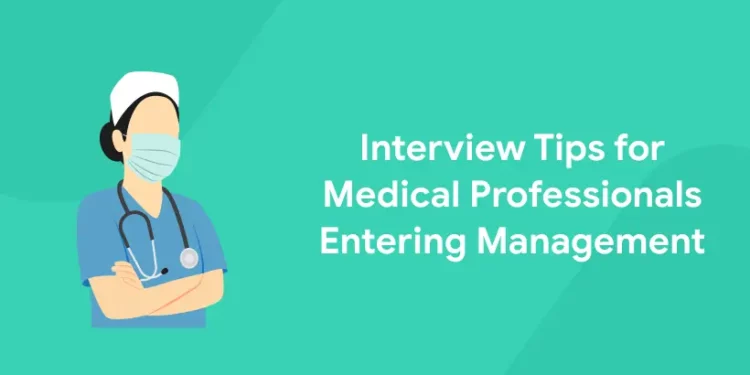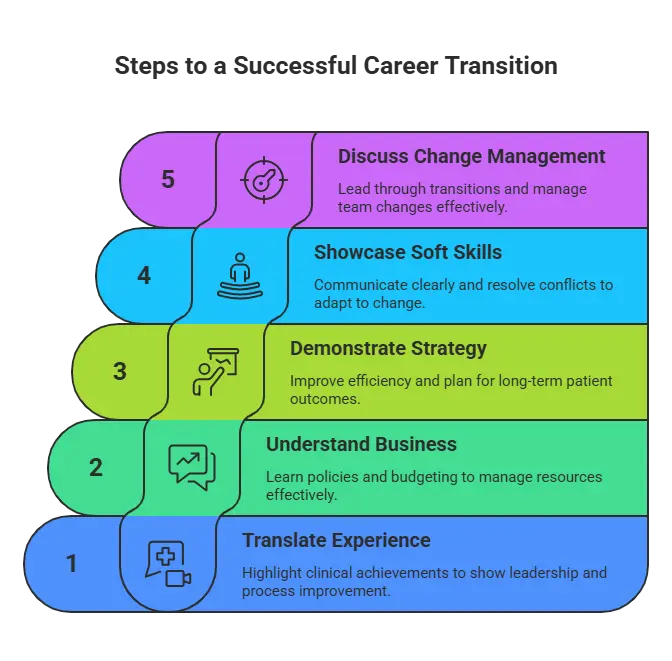Table of Contents
The healthcare industry is continuing to evolve at a fast pace. This brings the need for strong, knowledgeable, compassionate, and strategic leaders more than ever. And who are more suitable than medical professionals themselves to take up administrative and leadership roles in the healthcare industry? They are not just for managing teams or a hospital. These are the people who will shape the future of healthcare delivery. But you should pursue relevant qualifications and prepare for the interview seriously if you want to achieve this. In this blog, we will discuss some interview tips for medical professionals entering management.
Are you a clinician trying to make this transition? You might not be the only one thinking about this. Many nurses, physicians, and allied health workers are opting for administrative and management roles to further their careers, improve their remuneration, and drive change from within the health care system.
Want to learn interview tips for medical professionals entering management? Join Entri!
Interview Tips for Medical Professionals Entering Management: Introduction
The decision to change from clinical roles to management and administrative roles can be quite challenging and intimidating to health professionals. You might be a nurse, physician or allied health professional with years of experience. But getting hired into leadership roles needs an entirely new set of competencies. You need to develop these skills as well as demonstrate these skills effectively to the panel interviewing you for the desired role.
Leadership roles in the healthcare industry require more abilities than just clinical expertise. You need the following skills:
- Good communication skills
- Ability to drive operational excellence
- Financial knowledge
- Data Analytics knowledge
- Regulatory knowledge
The first step to achieving this goal is acquiring the needed skills. The best way to do this is to attend an online course. If you join an online course, then you can acquire the necessary skills while working in your clinical profession itself. The flexible schedule offered by online courses will help you learn without taking leave or quitting your present profession. Have you heard about the Entri Elevate platform’s Hospital Administration Course?
This guide will give you detailed and practical tips for interview that determines your career transition from clinical roles to healthcare management roles.
Interview Tips for a Successful Transition
1: What is the primary role of a hospital administrator?
Some interview tips for medical professionals entering management are discussed in the table below.
| Key Focus Area | What to Do | How to Demonstrate It |
| Translate Clinical Experience | · Lead initiatives
· Supervise teams · Improve processes |
Use the STAR method:
· Situation · Task · Action · Result |
| Understand the Business Side | · Learn policies
· Know budgeting · Manage resources |
Show knowledge of:
· Healthcare systems · Compliance · Quality improvement |
| Demonstrate Strategic Thinking | · Improve efficiency
· Boost patient outcomes · Plan long-term |
Give examples of:
· Strategy · Department growth |
| Showcase Soft Skills | · Communicate clearly
· Resolve conflicts · Adapt to change |
Share examples of:
· Teamwork · Mentoring |
| Discuss Change Management | · Lead through transitions
· Manage team changes |
Explain how you:
· Guided teams · Kept morale high |
Hospital Administration Course with Assured Career Growth
Hospital Administration Course by Entri App: Master essential healthcare management skills, gain certification, and secure top roles in leading hospitals
Join Now!Common Interview Questions and How to Answer Them
There are some common questions asked in interviews when hiring candidates from a clinical background to management roles. Some of them are discussed below.
| Interview Question | How to Answer / Tip |
| Why are you transitioning into a management role? | · Focus on passion for leadership
· Emphasise systems improvement · Mention the desire for a broader impact |
| Describe a time you had to manage conflict in your team. | · Show emotional intelligence
· Explain how you mediated and resolved tension |
| How do you prioritise tasks in a high-pressure environment? | · Share a clear method (e.g., Eisenhower Matrix)
· Explain your triaging process |
| How do you handle underperforming staff? | · Emphasize coaching
· Mention performance reviews · Talk about setting clear expectations |
| How do you align your team’s work with organisational goals? | · Highlight setting SMART goals
· Discuss communicating a clear vision |
| How do you motivate your team? | · Talk about recognising efforts.
· Encourage collaboration · Set clear goals |
| Describe a challenging decision you had to make. | · Explain your thought process
· Show consideration of all factors · Describe the outcome |
| How do you handle stress and pressure? | · Share coping strategies
· Talk about staying organised · Emphasise maintaining focus |
| What leadership style do you follow? | · Mention flexibility
· Talk about leading by example · Emphasize communication |
| How do you ensure compliance with healthcare regulations? | · Show knowledge of regulations
· Discuss training and audits · Mention continuous monitoring |
What Recruiters Look for in Medical Admin Candidates?
Some of the things recruiters might look for in a medical admin candidate are listed below.
| Key Trait | What Recruiters Look For |
| Leadership Potential | · Inspire and guide teams
· Hold team members accountable |
| Analytical Skills | · Use data for decisions
· Solve problems effectively |
| Healthcare Knowledge | · Understand regulations
· Know insurance and workflows |
| Communication Abilities | · Communicate clearly
· Interact professionally with all groups |
| Cultural Fit | · Share the organisation’s values
· Match leadership style |
You can achieve all these skills if you attend a course in hospital administration. And what is more convenient than an online course to learn a short-term professional course? Entri elevates the hospital administration course, something you should check out if you desire to go into admin roles in the healthcare industry.
Click here to learn more about Entri’s elevate hospital administration course! Join now!
Interview Tips for Medical Professionals Entering Management: Conclusion
We have discussed interview tips for medical professionals entering management in this blog. Moving to a management position is a natural career progression for someone working in clinical roles, especially if the management roles are in hospital administration. This is the best career trajectory for medical professionals looking to broaden their impact. Your career background in clinical aspects is your strongest asset when competing for a position in a hospital administration role. Interview tips for medical professionals entering management focus on leadership, communication, and linking clinical expertise to admin roles. The only thing you have to do is reframe your potential. Take the necessary course and improve your management, leadership and strategic skills. During the time of the interview, demonstrate administrative readiness and express genuine enthusiasm to become a leader.
Hospital Administration Course with Assured Career Growth
Hospital Administration Course by Entri App: Master essential healthcare management skills, gain certification, and secure top roles in leading hospitals
Join Now!Frequently Asked Questions
Should I discuss clinical stories in a management interview?
Yes, but frame them to emphasise leadership, systems thinking, or administrative insights gained.
How can I show leadership if I haven’t had a formal leadership title?
Discuss initiatives you’ve led, times you’ve mentored others, or ways you’ve influenced decision-making.
What if I don’t have direct management experience?
Focus on transferable skills—team coordination, committee leadership, or project management from your clinical role.
Do I need an MBA or additional qualification to move into medical management?
While not always required, having formal training in management or administration (e.g., MPH, MHA, MBA) can strengthen your candidacy.












